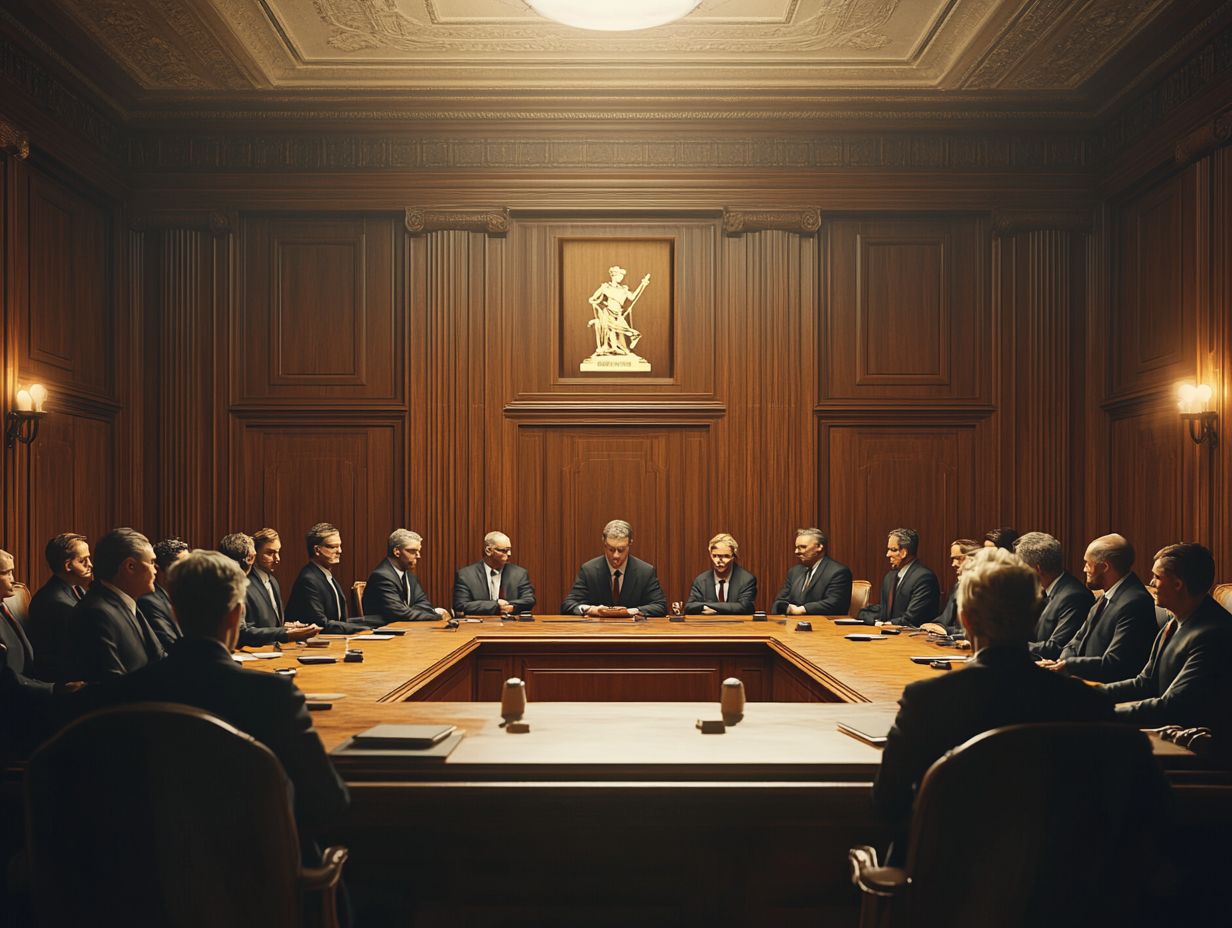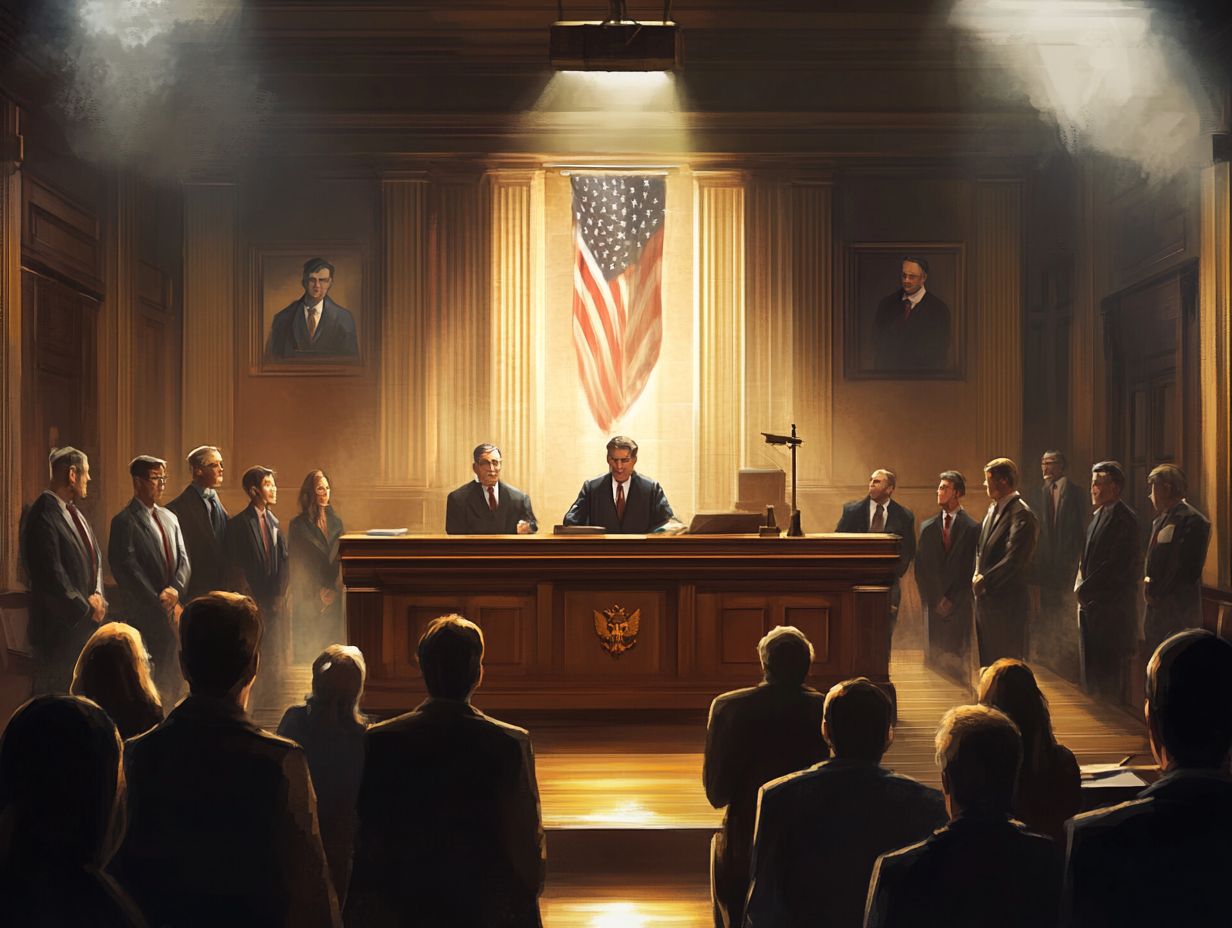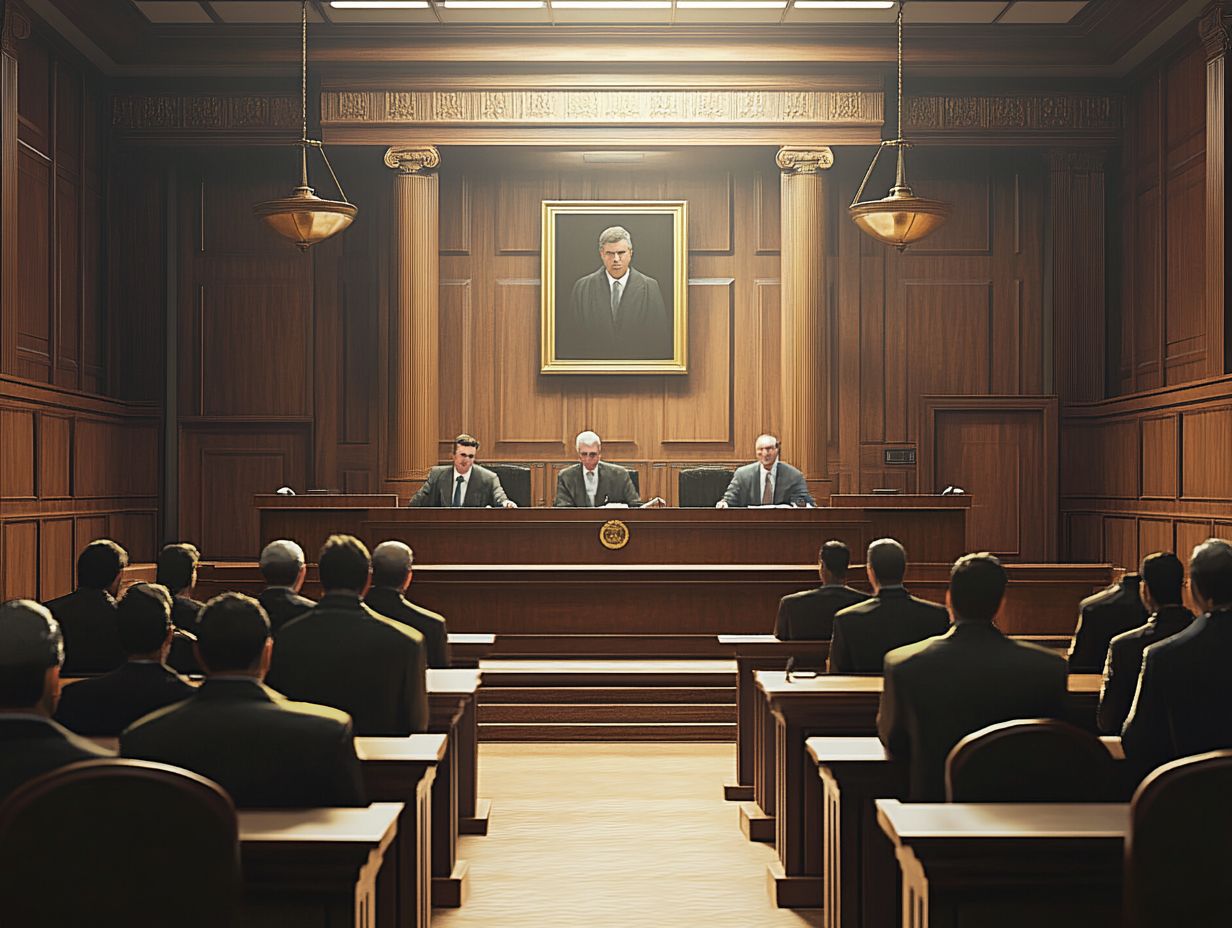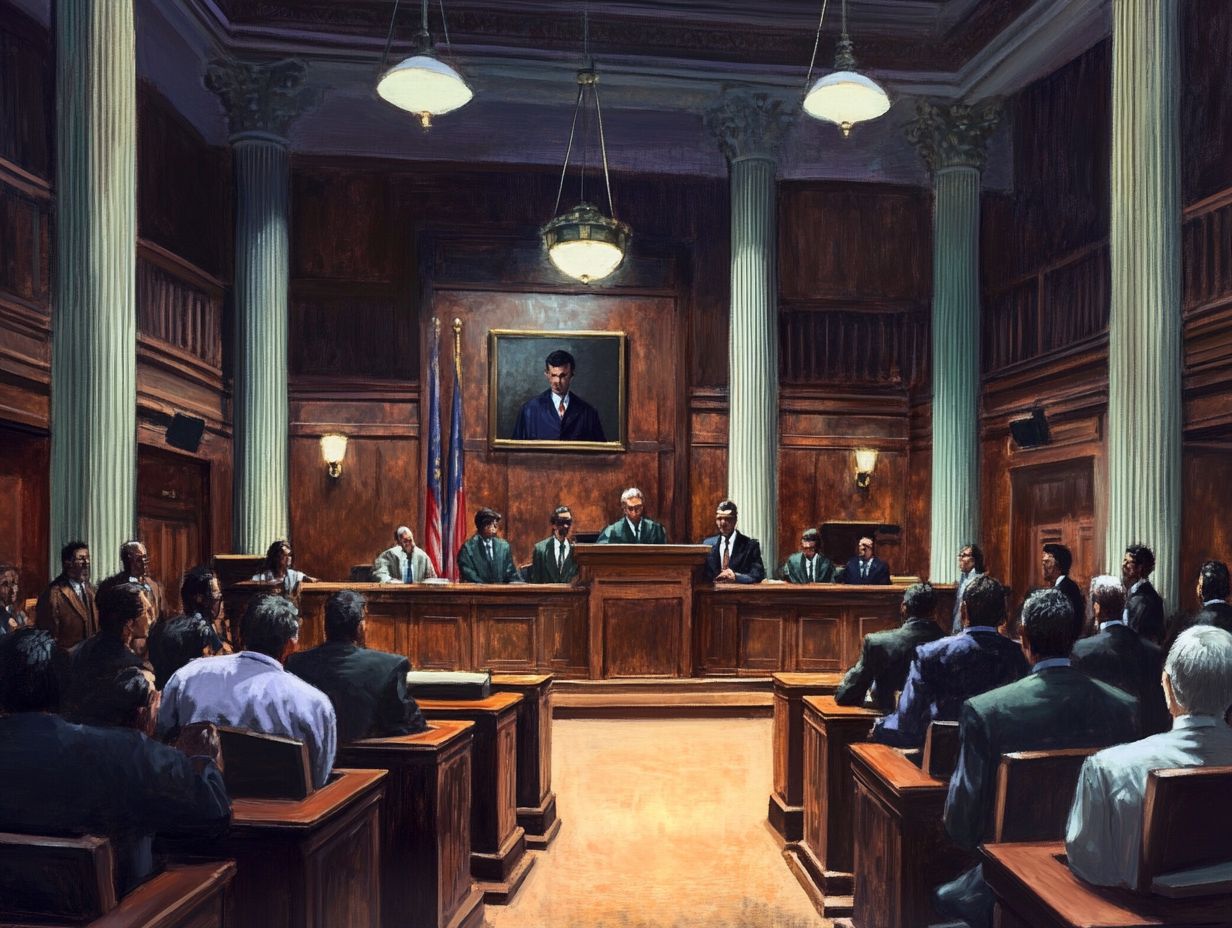Top 5 Famous Trade Secret Cases
In the realm of business, competition often relies on more than just savvy marketing strategies and product excellence; trade secrets are essential for maintaining that all-important competitive edge.
Consider the legendary rivalries, such as Coca-Cola versus PepsiCo or tech giants Google against Uber. The stakes are immense, and the implications resonate deeply within the industry.
Let s explore five notable trade secret cases that reveal the fierce battles behind the scenes! Uncover how companies protect their valuable secrets and the valuable lessons that can be gleaned from these high-profile disputes.
Contents
- Key Takeaways:
- 1. Coca-Cola vs. PepsiCo
- 2. Google vs. Uber
- 3. Apple vs. Samsung
- 4. KFC vs. Chick-fil-A
- 5. Nike vs. Adidas
- What Are Trade Secrets and Why Are They Important?
- Frequently Asked Questions
- What are the top 5 famous trade secret cases?
- What was the outcome of the Coca-Cola v. PepsiCo case?
- What was the main issue in the DuPont v. Kolon case?
- What was the significance of the Waymo v. Uber case?
- What was the outcome of the Apple Inc. v. Samsung Electronics Co. case?
- What trade secrets were at the center of the Google Inc. v. Oracle America Inc. case?
Key Takeaways:

- The rivalry between Coca-Cola and PepsiCo is not just about taste, but also trade secrets. The companies have a long history of legal battles over their secret formulas.
- In the Google vs. Uber case, Uber was accused of stealing self-driving car technology from Google’s subsidiary, Waymo. This trade secret case was settled for $245 million.
- Apple and Samsung’s battle over smartphone technology and design is one of the most famous ongoing trade secret cases. The companies have been locked in legal disputes for over a decade.
- KFC and Chick-fil-A’s feud over their fried chicken recipes highlights the importance of protecting trade secrets in the competitive fast food industry.
- The competition between Nike and Adidas isn’t just about sports apparel, but also trade secrets. In 2014, a former Nike designer was accused of stealing trade secrets and sharing them with Adidas.
- Trade secrets are valuable assets for businesses and can include anything from technological innovations to customer lists. Companies must have proper laws, regulations, and strategies in place to protect their trade secrets.
- Misusing or disclosing trade secrets can have serious consequences, including legal action and damage to a company’s reputation. Businesses must ensure that their employees and partners understand the importance of keeping trade secrets confidential.
- There are various methods that businesses can use to protect their trade secrets, such as non-disclosure agreements, restricted access to sensitive information, and implementing confidentiality policies.
- These famous trade secret cases are urgent reminders for businesses to protect their secrets fiercely!
1. Coca-Cola vs. PepsiCo
The rivalry between Coca-Cola and PepsiCo plays a key role in the competition among beverage companies. These secrets significantly influence marketing strategies, product launches, and even legal wranglings over private information and formulas that define their brands.
As two of the most recognized names in the soft drink market, Coca-Cola and PepsiCo are engaged in an ongoing battle not just for market share but also for the protection of their trade secrets, which provide a crucial competitive edge.
This fierce competition has led to high-profile cases where one company has accused the other of stealing trade secrets, revealing just how far they’ll go to safeguard their intellectual property. For instance, back in the early 2000s, allegations surfaced about an employee leaking confidential information from Coca-Cola to PepsiCo, underscoring the delicate balance between innovation and confidentiality.
To maintain their positions, both companies consistently implement robust security measures and strategic marketing initiatives. They often employ cutting-edge advertising campaigns that do more than just promote their beverages; they reinforce brand identities while keeping their product formulations tightly under wraps.
2. Google vs. Uber
The clash between Google and Uber reveals the complex world of trade secrets in technology and transportation, particularly regarding autonomous vehicle development and employee loyalty agreements that prevent corporate espionage.
Employee loyalty agreements serve as a crucial shield for companies aiming to protect their innovations and proprietary information.
In a striking example, a former Google engineer allegedly downloaded thousands of files before transitioning to Uber. This highlights the fierce competition and lengths individuals may go to secure an advantage.
Such breaches lead to legal consequences such as lawsuits and significant fines and can shake investor confidence, disrupting the vibrant landscape of emerging tech startups.
The repercussions can cascade, impacting not only the companies involved but also their workforce and the broader market, where trust and reliability are essential for collaboration in this ever-evolving industry.
3. Apple vs. Samsung
The ongoing legal battles between Apple and Samsung provide a fascinating case study in trade secret litigation, showcasing the delicate balance of patent protection and economic espionage.
This rivalry reflects a larger narrative about innovation and market dominance, as both giants fiercely pursue legal avenues to defend their intellectual property.
The disputes have led to high-profile court cases and surprising allegations of industrial spying, where confidential designs and strategies may have been compromised.
Such actions have sparked a flurry of lawsuits, emphasizing the critical role of patent law in shaping corporate behavior. Each legal skirmish has profound implications for their business strategies, influencing product development, market entry tactics, and the competitive landscape in the tech industry.
4. KFC vs. Chick-fil-A

The rivalry between KFC and Chick-fil-A underscores the significance of trade secrets, particularly their meticulously guarded recipes. These secret recipes are the heart of their businesses, attracting franchisees in a crowded marketplace.
These proprietary ingredients influence the beloved taste profiles customers crave and the operational strategies that lead to franchise success.
By maintaining strict confidentiality around their recipes, both brands cultivate an aura of mystique and exclusivity, fostering consumer loyalty and sparking curiosity.
This strategy allows them to refine marketing tactics focused on these unique offerings while crafting compelling narratives that resonate with customers, distinguishing them in a competitive landscape.
Ultimately, the astute management of these trade secrets serves as a strategic asset both culinary titans use to nurture lasting relationships with their fans and franchise partners alike.
5. Nike vs. Adidas
The fierce competition between Nike and Adidas highlights the crucial role trade secrets play in crafting marketing strategies and gaining an edge in the global sportswear arena.
Both brands skillfully tap into consumer curiosity to enhance their appeal. By weaving compelling narratives around their innovative technologies and distinctive designs, these giants capture attention and foster a loyal following.
Nike often emphasizes its cutting-edge performance advancements through high-profile endorsements, while Adidas focuses on sustainability and partnerships with influential designers.
This strategic differentiation shapes their brand identities and sways purchasing decisions in a saturated marketplace. Both companies adeptly navigate this competitive terrain by continuously adapting their marketing tactics to resonate with shifting consumer values and trends.
What Are Trade Secrets and Why Are They Important?
Trade secrets are crucial assets for your business. They include proprietary information like formulas, recipes, and techniques that give you a significant advantage in the marketplace.
These secrets foster innovation and economic growth. They also require strong protections against unauthorized disclosure and potential legal action.
Valuable trade secrets can range from manufacturing processes to unique customer lists and marketing strategies. For example, the Coca-Cola formula is a classic case of a trade secret that is carefully guarded to maintain market dominance.
Tech companies also rely on proprietary algorithms that enhance their products and services. Protecting these secrets is essential for survival.
Many businesses use legal frameworks such as the Uniform Trade Secrets Act (UTSA) and the Defend Trade Secrets Act (DTSA) to ensure protection against theft. If this information is compromised, the consequences can be severe, leading to financial loss and a diminished competitive edge.
What Are the Laws and Regulations Surrounding Trade Secrets?
The legal landscape for trade secrets involves federal and state regulations, including the Defend Trade Secrets Act. This act provides a way to take legal action against corporate spying and unauthorized use of your proprietary information.
This law encourages you to protect your sensitive information. It also gives you the power to seek remedies in federal court.
With state laws, these regulations clearly define what qualifies as a trade secret. This adds an important layer of protection against theft.
The stakes are high for your business. If involved in trade secret litigation, you might face significant monetary damages and court orders to stop further violations.
What Are the Common Types of Trade Secrets?

Common types of trade secrets include formulas, recipes, business strategies, and customer lists. These are vital for maintaining a competitive edge in various industries.
For example, the Coca-Cola formula remains a closely guarded secret, giving the company a unique offering. Similarly, KFC protects its famous blend of 11 herbs and spices with great care.
In tech, companies protect their source code, algorithms, and product designs as trade secrets. These assets help them stand out from competitors.
Protecting these secrets is absolutely crucial. Any leak could lead to substantial financial losses and a major drop in consumer trust.
What Are the Potential Consequences of Misusing or Disclosing Trade Secrets?
Misusing or disclosing trade secrets can lead to serious penalties, damage awards, and court orders to stop further violations, especially if employee loyalty agreements are broken.
The fallout often exceeds financial penalties. It can damage reputations and strain business relationships.
When a trade secret is compromised, the affected party can initiate legal action. Remedies may include compensatory damages for lost profits and punitive damages to deter future violations.
Consider high-profile cases involving DuPont and Coca-Cola. These companies have fought hard in court to reclaim their proprietary information, showcasing the need for strong protections.
How Can Businesses Protect Their Trade Secrets?
You must take strong actions to protect your trade secrets today! This includes non-disclosure agreements, strong security systems, and employee loyalty agreements that prevent unauthorized access and the disclosure of confidential information.
It’s also important to cultivate a culture that prioritizes privacy. Regular training sessions can enhance awareness of the significance of trade secrets. This equips your team with the knowledge to identify potential risks.
Establishing clear protocols for information handling is crucial in reinforcing these practices. Encouraging open communication about confidentiality expectations and consequences helps foster a sense of responsibility among staff, making them more vigilant in protecting these valuable assets.
By integrating legal, technological, and cultural approaches, you can create a comprehensive framework that effectively shields your competitive advantages.
What Can Be Learned from These Famous Trade Secret Cases?
Famous trade secret cases provide invaluable insights into the ramifications of economic and corporate espionage. They showcase the critical importance of protecting original ideas through trade secret litigation and highlight the delicate balance between innovation and competition.
As you navigate this complex landscape, understanding how breaches in confidentiality can profoundly affect your market position and overall success is vital.
For example, the notable Epic Games vs. Apple case underscores the necessity for robust legal frameworks to safeguard your unique innovations. Similarly, the DuPont and Kolon Industries case serves as a cautionary tale, illustrating the severe consequences companies face when they neglect their proprietary information.
Safeguarding trade secrets isn t just a legal requirement; it s a strategic imperative. These incidents emphasize that in today’s aggressive marketplace, maintaining trade secret protections is essential to secure your competitive edge and cultivate a culture of trust and creativity.
Frequently Asked Questions

What are the top 5 famous trade secret cases?
The top 5 famous trade secret cases are: Coca-Cola v. PepsiCo (1981), DuPont v. Kolon (2009), Waymo v. Uber (2018), Apple Inc. v. Samsung Electronics Co. (2012), and Google Inc. v. Oracle America Inc. (2016).
What was the outcome of the Coca-Cola v. PepsiCo case?
Coca-Cola and PepsiCo settled. PepsiCo withdrew Crystal Pepsi, and Coca-Cola dropped its lawsuit.
What was the main issue in the DuPont v. Kolon case?
The main issue in the DuPont v. Kolon case was the alleged misappropriation of trade secrets related to DuPont’s Kevlar product, which is a strong material used in bulletproof vests and other protective gear.
What was the significance of the Waymo v. Uber case?
The Waymo v. Uber case was significant because it was one of the first trade secret cases involving self-driving car technology. Waymo, a subsidiary of Google, accused Uber of stealing its trade secrets related to LiDAR technology, which is a method of measuring distances using laser light to create detailed maps.
What was the outcome of the Apple Inc. v. Samsung Electronics Co. case?
The outcome of the Apple Inc. v. Samsung Electronics Co. case was a jury verdict awarding Apple $1.05 billion in damages for Samsung’s infringement of its iPhone design and utility patents. However, the case went through multiple appeals, and the final settlement amount was significantly reduced.
What trade secrets were at the center of the Google Inc. v. Oracle America Inc. case?
The trade secrets at the center of the Google Inc. v. Oracle America Inc. case related to the Android operating system and its use of Java code. Oracle, the owner of Java, sued Google for using its code without permission or a license.






